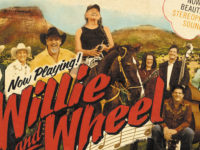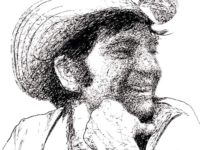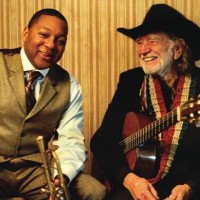When I moved to Texas in 1984, I thought I knew about country music.
For me, Hank Williams was the alpha and the omega. Nothing else mattered. And while Hank is important, my new music friends in Texas patiently made me aware of country artists old and new – people like the Louvin Brothers, Doug Sahm and Lefty Frizzell. There was one they praised highly who I already knew before moving to Texas – or I thought I knew – Willie Nelson.
I had heard Willie’s hits that crossed into the pop charts, like “Always on My Mind” and “On the Road Again.” But it wasn’t until I hit the deeper regions of Texas that Willie Nelson’s music took hold. That’s when people played records I had never heard before: Early Willie like “Half a Man,” “One in a Row,” and “I Just Can’t Let You Say Goodbye.” His albums were also part of my education – Phases and Stages and, of course, Red Headed Stranger.
The Red Headed Stranger record had come out in 1975, almost a decade before I hit Texas, but I only knew “Blue Eyes Cryin’ in the Rain.” And I was not all that impressed because, even though Willie sang it well, this wasn’t his tune. I knew it as an old song, written by Fred Rose.
So much for ignorance. I soon learned that Willie took pride in country’s past. He regularly recorded older songs that he felt were worth reexamining, or those he just liked to sing. Some of Willie’s most famous recordings are of songs he didn’t write, like “Blue Skies” and “Faded Love.”
Singing the songs of other writers is something Willie Nelson had always done. His first chart entry was a 1962 duet called “Willingly,” written by Hank Cochran. And Willie is the man who once introduced a song to his Fort Worth audience as being by “a pretty fair little country group,” before singing the Beatles’ “Yesterday,” calling it “a very great piece of material.” This was in 1966!
As usual, Willie was ahead of the curve. Some people noticed. Maybe Willie’s genre-bending nature is why Miles Davis, as early as 1970, named a composition “Willie Nelson.”
Audiences and music colleagues admire Willie Nelson. It’s no wonder that a concert was planned for his 90th birthday. The closest parallel I can think of was a 1991 celebration of Bob Dylan’s 40 years as a recording artist, or maybe the Band’s Last Waltz concert of 1976. The gathering for Willie was to be lavish – two nights of performances held at the Hollywood Bowl. There was no chance I could attend.
I knew it would be filmed on Saturday and Sunday, April 29-30, 2023, but was surprised at how quickly it was released. A movie of some performances from the two concerts appeared in theaters last June. Its theatrical run was brief but, at nearly three hours, the film is not.
I was looking forward to seeing Long Story Short: Willie Nelson 90 and was glad I did. It provided great music, was beautifully filmed, and the audio was excellent. Performances were seamlessly edited into a single concert. Because of the length of this two-night event, not all the music could be included.
The house band used by all the performers was led by Don Was, who also played bass. Willie’s longtime harmonica player Mickey Raphael often acted as de facto foil for a musician’s comment or as temporary frontman, depending on what was needed. I won’t attempt to describe the entire movie, but here are some moments I found notable:
— The festivities begin with bluegrass newcomer Billy Strings singing “Whiskey River.” Willie himself has used this Johnny Bush number to open his own shows for years. An appropriate start, performed well.
— Lyle Lovett seemed positively nervous as he told the audience of the personal importance of “Hello Walls” and then gave a fine rendition of the song, so crucial to Willie’s early career. Country star Faron Young turned “Hello Walls” into a No. 1 hit in 1961, giving Willie a lot of cred in Nashville and some needed money.
— I was glad that Willie’s recently departed sister Bobbie Nelson was not forgotten. She was Willie’s band pianist for decades. Willie often praised her knowledge of music theory, which he said surpassed his own. Norah Jones played the piano-pounding instrumental “Down Yonder” from Red Headed Stranger. Jones’ tribute to Bobbie Nelson was combination of joy and reverence – no small trick for an up tempo barrel house number.
— Jamey Johnson gave a moving tribute to Willie, talking about how much he had learned from him as a performer and a friend. Then, with the assistance of Booker T. Jones on keyboards and Warren Haynes on guitar, Johnson sang a powerful and slow burning “Georgia on My Mind.”
— A touching moment came when Rosanne Cash brought a fragile Kris Kristofferson to the stage for a duet of “Loving Her Was Easier Than Anything I’ll Ever Do Again,” a song Willie Nelson recorded on a full album of Kristofferson material.
— The most unexpected big name was Tom Jones, who sang “Opportunity to Cry.” The audience may have been confused by his presence, but Jones knew what he was doing with this older Nelson number.
— Bob Weir represented Willie’s acceptance by an entire sub-culture, taking a somber approach to “Blue Eyes Cryin’ in the Rain.”
— Sturgill Simpson made his first stage appearance since 2021. His rendition of the Steve Fromholz ballad “I’d Have to Be Crazy,” from Willie’s The Sound in Your Mind album, let the audience know that his vocal cords are in good shape.
— The Lumineers showed how talented musicians can transport an audience. Even though this was a late April night in Los Angeles, Wesley Schultz and Jeremiah Fraites sang a moving version of Willie’s Christmas number, “Pretty Paper.” The Lumineers’ arrangement paid tribute to both the composer and to Roy Orbison, who first had a hit with the song.
— Beck sang the beautiful “Hands on the Wheel” from Red Headed Stranger but never seemed comfortable with it. I think this was partly because Beck was so tied to the lyric monitor at his feet.
A lyric monitor scrolls through the words of a song as the performer sings. Its purpose is for musicians to make sure they are singing the right lyrics. At this type of event, performers should know the songs! If they need a reminder concerning a specific line, that’s one thing – but throughout the night, several singers were constantly staring at the lyric monitor. I sometimes wondered if they really knew the song.
I won’t call down the other sinners here, but there were quite a few guilty parties.
Speaking of “calling down the sinners,” Willie’s diverse catalog of songs was fairly well represented, but one ignored area was his religious music. Nobody was touching “The Troublemaker” or any material from the spiritual concept record Yesterday’s Wine. Even the great “Family Bible” was left unsung.
Near the end of the night a medley of “Will the Circle Be Unbroken” and “I’ll Fly Away” was sung by the entire ensemble, but the body of the concert remained secular. “That Lucky Old Sun” or “Amazing Grace” would have demonstrated another side of this complex musician.
The film’s producers likely felt some artists were mandatory inclusions, such as Willie’s two sons. Lukas Nelson sang “Angel Flying Too Close to the Ground,” while his brother, known professionally as Particle Kid, played the breakup song “The Ghost,” a rarely covered number recorded by his father during his RCA years. Both performances were solid and were welcome additions to the film.
— There were others, many others. Willie himself sang separate sets with George Strait, Neil Young, Snoop Dog, and Keith Richards. This diversity of fellow performers who are also Willie’s fans speaks to the man’s great appeal.
— Some performers were missed. Many of Willie Nelson’s old friends and collaborators were unable to attend – including Johnny Cash, Waylon Jennings, Leon Russell and longtime band guitarist Jodi Payne, to name a few of the departed. But when Dave Matthews sang a solo version of “Funny How Time Slips Away,” it made me wonder why the still-active John Mellencamp was not at the event. All the other Farm Aid organizers were present and performing – Matthews, Neil Young, Margo Price. But not Mellencamp.
There were others who I think should have been there but were not. Dolly Parton would have been a welcome addition, and she had a legitimate connection — more than some of the participants. Dolly and Willie charted a Top 10 country duet in 1982 with “Everything is Beautiful (In its Own Way).” I didn’t need to hear that particular number, but Parton is always a welcome presence at any gathering. Hearing her interpret a Willie song could have been a concert highlight.
Another female performer who would have probably accepted the invitation to appear and even don her old cowboy gear was k.d. lang. I once saw lang do a great job with “Three Days.” Such a performance would have been welcome for including another strong woman vocalist and for the addition of an early Willie song, an area which was underrepresented.
Speaking of missing women, where was the duo Folk Uke? This group includes Willie’s daughter Amy Nelson, along with Cathy Guthrie, daughter of Arlo. A typically irreverent song from these women like their “Shit Makes the Flowers Grow” would have been just the thing to balance the sometimes overly reverential feel of the event.
Willie Nelson released an album with trumpeter Wynton Marsalis. As with Dolly, Marsalis’ presence could have taken the night to a whole other level. But Wynton wasn’t there. A Willie Nelson song performed by onetime duet partner Bob Dylan could have been interesting, but nobody expected him — partly because he’s on tour in Europe and partly because he’s Bob.
I said earlier that the movie was three hours of edited performances from two long nights of music. I did not say it contained all the highlights. What was performed at the Hollywood Bowl not included in the movie? Lots, and some rightly so. But there are two numbers the producers chose not to use that I found especially puzzling.
One was by the Chicks, formerly the Dixie Chicks. They played a hot version of Willie’s “Bloody Mary Morning.” Not since their pre-hits days had I seen the Chicks give such a hard-driving bluegrass performance. How did I see it, you ask, if it was not in the movie? Fortunately, some audience members recorded the event themselves. And I thank them, for several of the concerts’ deleted performances now appear on YouTube.
Another surprising exclusion was Dwight Yoakam singing “Me and Paul,” the autobiographical tale of Willie’s life on the road before stardom. Norah Jones had brought Bobbie Nelson to the party with “Down Yonder.” Dwight’s take on “Me and Paul” would have been the perfect way to include Willie Nelson’s loyal, departed drummer Paul English. But Dwight was left out of the movie. Why? Surely the Chicks and Dwight Yoakam each have enough name recognition and star power.
I understand that there was not time for every performance, but to cut the Chicks and Dwight? What did the producers of this concert movie find more screen worthy?
One questionable inclusion was by Nathaniel Rateliff, who sleepwalked his way through “A Song for You,” simultaneously doing a disservice to composer Leon Russell, Willie and the song itself.
Guitarist Gary Clark, Jr., played “Texas Flood,” made famous by Stevie Ray Vaughan. “Here’s a song by a friend of Willie’s,” Clark said. Is that enough of a connection for an event such as this? Strikes me as lazy. Couldn’t Clark at least have adapted his blues licks for one of Willie’s own numbers, like “Rainy Day Blues”? There were other questionable inclusions, like celebrity introductions. These made the event appear a little too “camera ready” at times.
One thing that bothered me about several of the artists was their obsession with Willie’s use of marijuana. That Willie Nelson smokes pot is no secret. He himself will tell you this, he sings about it, and his Texas police record will confirm it. But to make this a defining feature of the man diminishes Willie’s musical abilities. Pot should not be a focal point in Willie’s legacy.
This distraction reminds me of Dolly Parton’s career, when talk show hosts spoke more glowingly about Dolly’s cleavage than of her musical talent. They rarely mentioned her gifts as a songwriter or singer. Don’t get me wrong – I have no problem with cleavage or with marijuana. But making Willie’s use of pot the point of so many comments in the movie distracted from his importance as a musician.
When it was announced that a celebratory concert for Willie Nelson’s 90th birthday was to be staged at the Hollywood Bowl, my wife was not happy. She immediately yelled: “Hollywood? Why don’t they hold the concert in Texas?” She nailed it. Why not Texas? And that question sums up the event – well meaning, heartfelt, and often well performed. But a few intangibles were lacking.
This was Willie light, Willie for the masses. The event was entertaining, yes, but it needed a stronger dose of deep Willie Nelson. Placing the concerts in Texas would have been a good start.
- ‘Cold War Country,’ by Joseph M. Thompson: Books - December 2, 2024
- Acknowledging an Influence? Or Grounds for a Lawsuit? - August 9, 2024
- Dickey Betts’ Star Rose as the Allman Brothers Band Grieved - April 19, 2024




